介词in-on.at-for.with-by-of的基本用法
介词
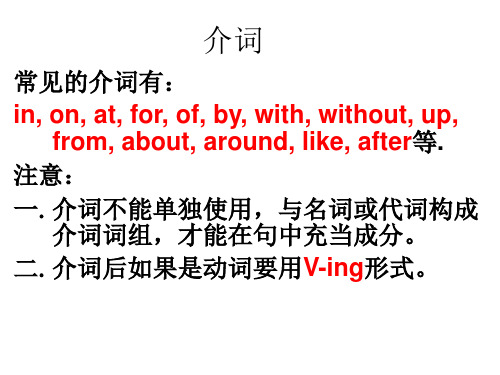
三. 表示方位的介词 二)over, under, above, below的区别 1. over “在…正上方(垂直)”,也可以指 覆盖,“在…上面”,反义词是under. eg: There is a bridge over the river. 2. under “在…正下方(垂直)” 。 eg:The cat is sleeping under the table. 3. above“在…的下面,低于…”,不一定垂 直,反义词是below。
except, except for
except 同类中“除了。。。之外” except for 非同类中“除了。。。之外” (整体肯定,局部修正) The shop is open everyday except Sunday. He is a handsome guy except for a little fat. Your writing is good except for a few grammar.
七.固定搭配的介词短语 四)动词+形容词+介词 be afraid of, be angry with, be able to, be good at, be good for, be proud of, be famous for, be late for, be full of, be filled with, be interested in, be pleased with, be different from, est.
二)after, in 的区别 1. in +一段时间,表示将来的一段时间之后, 用于将来时。 2. After+一段时间 表示过去的一段时间之后, 用于过去时。 如果after 后跟将来的某一个时刻,也可 以用于将来时。 in eg:He will come back_____a week. after a week. He came back ____ after 5 o’clock. He will come back _____
初一英语介词的用法归纳

初一英语介词的用法可以归纳为以下几点:
1.
表示时间:in,on,at。
表示在某年、某季、某月、某周、某天、某个世纪或某个年代时,用in 表达;
表示在具体的某一天或某一天的早上,下午或晚上时,用on 表达;
表示在某个时刻时,用at 表达。
2.
表示方位:in,on,to。
表示在某个范围内,用in 表达;
表示在某个物体的表面或边缘,用on 表达;
表示在某个方向或距离时,用to 表达。
3.
表示方式:by,with,in。
表示使用某种方式或工具时,用by 表达;
表示使用某种东西时,用with 表达;
表示穿着或戴着某种衣物或颜色时,用in 表达。
4.
表示原因:for。
表示因为某种原因或目的而做某事时,用for 表达。
5.
表示除了:except,besides。
表示从整体中除去某部分时,用except 表达;
表示除了某人或某物外还有其他的时,用besides 表达。
以上是初一英语介词的用法归纳,需要强调的是,介词的用法是多样的,具体使用需要根据语境和上下文来判断。
因此,在学习介词时需要多加练习和运用。
(完整版)高中英语介词用法大全
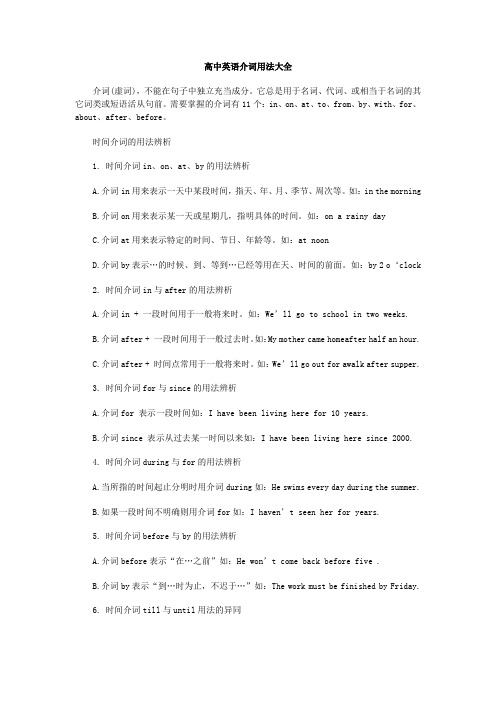
高中英语介词用法大全介词(虚词),不能在句子中独立充当成分。
它总是用于名词、代词、或相当于名词的其它词类或短语活从句前。
需要掌握的介词有11个:in、on、at、to、from、by、with、for、about、after、before。
时间介词的用法辨析1. 时间介词in、on、at、by的用法辨析A.介词in用来表示一天中某段时间,指天、年、月、季节、周次等。
如:in the morningB.介词on用来表示某一天或星期几,指明具体的时间。
如:on a rainy dayC.介词at用来表示特定的时间、节日、年龄等。
如:at noonD.介词by表示…的时候、到、等到…已经等用在天、时间的前面。
如:by 2 o‘clock2. 时间介词in与after的用法辨析A.介词in + 一段时间用于一般将来时。
如:We’ll go to school in two weeks.B.介词after + 一段时间用于一般过去时。
如:My mother came homeafter half an hour.C.介词after + 时间点常用于一般将来时。
如:We’ll go out for awalk after supper.3. 时间介词for与since的用法辨析A.介词for 表示一段时间如:I have been living here for 10 years.B.介词since 表示从过去某一时间以来如:I have been living here since 2000.4. 时间介词during与for的用法辨析A.当所指的时间起止分明时用介词during如:He swims every day during the summer.B.如果一段时间不明确则用介词for如:I haven’t seen her for years.5. 时间介词before与by的用法辨析A.介词before表示“在…之前”如:He won’t come back before five .B.介词by表示“到…时为止,不迟于…”如:The work must be finished by Friday.6. 时间介词till与until用法的异同A.till和until用在肯定句中,均可表示“直到…为止”,如:I will waittill(until)seveno'clock.B.till和until用在否定句中,均可表示“在…以前”或“直到…才”。
in,on ,at, by ,of ,with 介词区别与用法
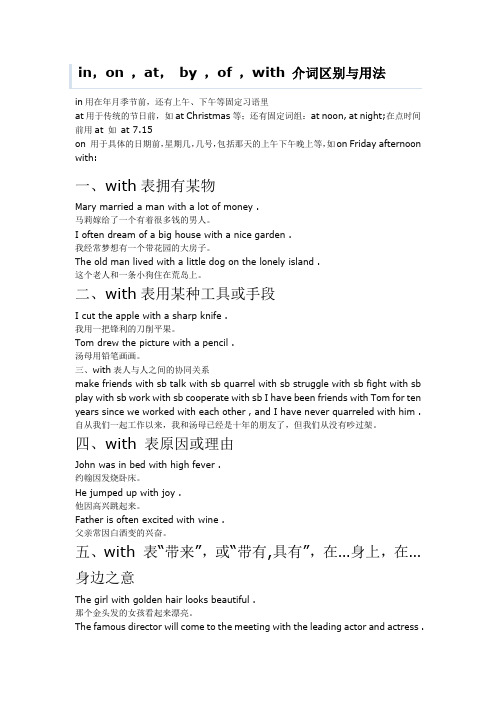
in,on ,at,by ,of ,with 介词区别与用法in用在年月季节前,还有上午、下午等固定习语里at用于传统的节日前,如at Christmas等;还有固定词组:at noon, at night;在点时间前用at 如at 7.15on 用于具体的日期前,星期几,几号,包括那天的上午下午晚上等,如on Friday afternoon with:一、with表拥有某物Mary married a man with a lot of money .马莉嫁给了一个有着很多钱的男人。
I often dream of a big house with a nice garden .我经常梦想有一个带花园的大房子。
The old man lived with a little dog on the lonely island .这个老人和一条小狗住在荒岛上。
二、with表用某种工具或手段I cut the apple with a sharp knife .我用一把锋利的刀削平果。
Tom drew the picture with a pencil .汤母用铅笔画画。
三、with表人与人之间的协同关系make friends with sb talk with sb quarrel with sb struggle with sb fight with sb play with sb work with sb cooperate with sb I have been friends with Tom for ten years since we worked with each other , and I have never quarreled with him . 自从我们一起工作以来,我和汤母已经是十年的朋友了,但我们从没有吵过架。
四、with 表原因或理由John was in bed with high fever .约翰因发烧卧床。
介词at--by--to--in--for--of--on--from--with地用法
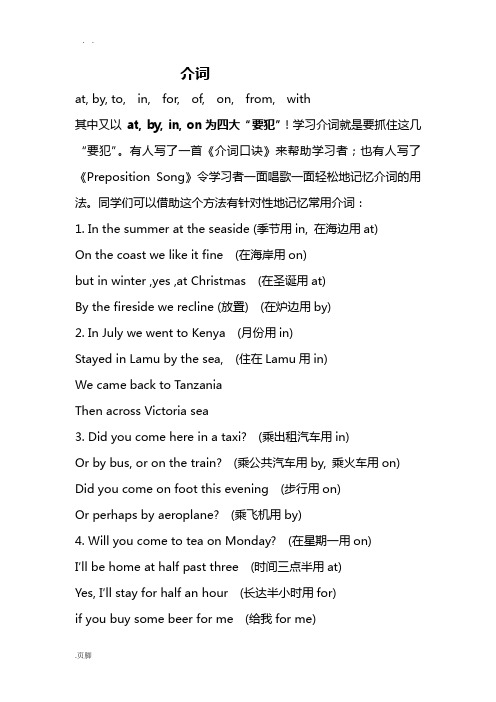
介词at, by, to, in, for, of, on, from, with其中又以at, by, in, on为四大“要犯”!学习介词就是要抓住这几“要犯”。
有人写了一首《介词口诀》来帮助学习者;也有人写了《Preposition Song》令学习者一面唱歌一面轻松地记忆介词的用法。
同学们可以借助这个方法有针对性地记忆常用介词:1. In the summer at the seaside (季节用in, 在海边用at)On the coast we like it fine (在海岸用on)but in winter ,yes ,at Christmas (在圣诞用at)By the fireside we recline (放置) (在炉边用by)2. In July we went to Kenya (月份用in)Stayed in Lamu by the sea, (住在Lamu用in)We came back to TanzaniaThen across Victoria sea3. Did you come here in a taxi? (乘出租汽车用in)Or by bus, or on the train? (乘公共汽车用by, 乘火车用on) Did you come on foot this evening (步行用on)Or perhaps by aeroplane? (乘飞机用by)4. Will you come to tea on Monday? (在星期一用on)I′ll be home at half past three (时间三点半用at)Yes, I′ll stay for half an hour (长达半小时用for)if you buy some beer for me (给我for me)5. In the morning I drink coffee (早晨用in the morning)In the afternoon there′s tea (下午用in the afternoon)In the evening I have cocoa (傍晚用in the evening)Yes, at night ,it′s good for me. (晚上用at night)6. Where′s my pencil?In the kitchen (厨房里in the kitchen) On the table near the chair (在桌上on the table, 在椅边near the chair)Underneath the cup and saucer(在杯和碟的下面underneath...)Just behind the teapot there (在茶壶后边behind...)7. Can you tell me how to get toMr. Johnson′s coffee-bar?Down the street and round the corner (down the street 沿着街道,round...绕过)Past the church and there you are8. Where′s the bookshop? Over there,dear (over there 那里) First turn left,then go straight on,Along the road,across the market (沿着路along the road, 穿过市场across...)It′s in front of you, dear John (在你前面in front of you)9. There is nothing on the radio (广播on the radio) "Songs with orchestra" they said. (with后orchestra为有形物,无形物则用by)I′m not interested in music (interested in 兴趣于)so I think I′ll go to bed10. In a moment I′ll be finished (in a moment 片刻里)With these prepositions-so I will say to you in Englishtill the next time, cheerio (加油呀) (till... 直到)记住这十段歌词后,你就学到许多介词用法了。
初中英语语法(in、on、of、with、by、at等用法汇总)
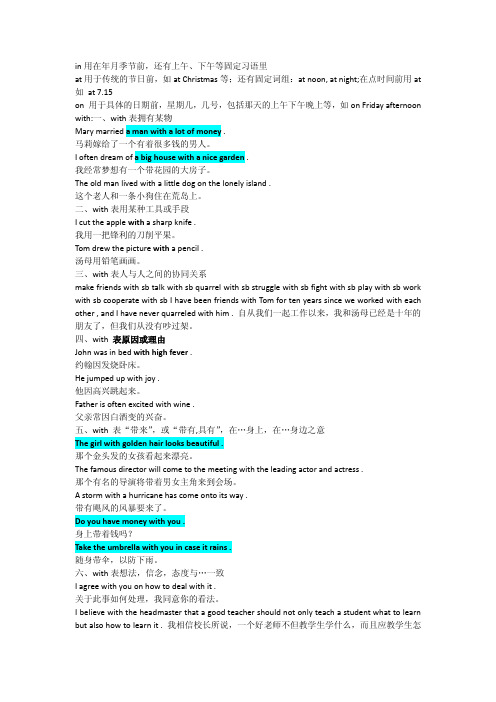
in用在年月季节前,还有上午、下午等固定习语里at用于传统的节日前,如at Christmas等;还有固定词组:at noon, at night;在点时间前用at 如at 7.15on 用于具体的日期前,星期几,几号,包括那天的上午下午晚上等,如on Friday afternoon with:一、with表拥有某物Mary married a man with a lot of money .马莉嫁给了一个有着很多钱的男人。
I often dream of a big house with a nice garden .我经常梦想有一个带花园的大房子。
The old man lived with a little dog on the lonely island .这个老人和一条小狗住在荒岛上。
二、with表用某种工具或手段I cut the apple with a sharp knife .我用一把锋利的刀削平果。
Tom drew the picture with a pencil .汤母用铅笔画画。
三、with表人与人之间的协同关系make friends with sb talk with sb quarrel with sb struggle with sb fight with sb play with sb work with sb cooperate with sb I have been friends with Tom for ten years since we worked with each other , and I have never quarreled with him . 自从我们一起工作以来,我和汤母已经是十年的朋友了,但我们从没有吵过架。
四、with 表原因或理由John was in bed with high fever .约翰因发烧卧床。
He jumped up with joy .他因高兴跳起来。
15个英语最常见的介词用法-极简英语

15个英语最常见介词(in on at of for...)的深层次含义英文中15个最常见的介词in/ on/at/of/ for/by /with/ from/to/as/ about/ around/ off/ through/ over一、in (在..里面)1.表示真实的位置: in the car/room2表示抽象的位置: in the book/movie3.表示状态: in danger, in trouble; in anger3.表示时间: in the morning/afternoon/evening. in April; in 20104.表示方式: in the way; in English5.表示穿着: in black shoes/T-shirt二、on (紧紧地接触-连着)1.表示真实的位置: on the table/wall2.表示抽象的位置: on the radio/TV; on the topic/event3.表示具体的时间: on Monday; on Monday morning; on May 4th4.表示状态: on duty; on holiday; the game is on三、at(在.点上)1.表示真实的位置: at home/the company/the store2.表示抽象的位置: be good/bad at English3.表示具体的时间: at 3 pm;at night; at the age of 204.表示状态: at work-在工作; at table-在吃饭四、Of(的-从属关系)1.表示"无生命主体的":the window of the room; top of the mountain...2.某某市: the city of Bejing3.表示数量: a piece/bx/bottle/pair.. of五、for(为了/因为/对时间/对.而言/支持赞成)1.表示为了":go for a walk; I come here fr my schoolbag2.表示"因为": Thank you for helping me; for the reason3.表示"时间"和: for 3 days; for a week; for a year4.表示对..而言": It is important for me5.表示”支持,赞成": Are you for this plan or against it?六、by(通过.交通工具/在.附近/街至.时间/被)1.表示"通过.交通工具":by train/subway/plane/air/ship/seaI learn English by watchingEnglish movies.2.表示在附近":a table by the window; the house is by the lake3.表示"截至到..时间":by the end of next week; by 20194.表示"被(被动语态)":English is spoken by people all over the world.七、with (伴随)1.表示"和.起":go with:play with;make friends with;cooperate with2.表示"携有,带有":a county with a long history; a house with a big garden3.表示..工具:cut the apple with the knife4.表示"伴随":with the development of the society;with the help of my teacher;I don't have any cash with me.八、from (远离)1.表示"来自":I am/come from China;a gift from my best friend;a man from America2.由"远离"来记短语:stop/prevent/keep sb from doing sth阻止某人做某事be away from...远离...be different from与.不同be absent from缺席....how far is it from here?它离这远The paper is made from wood.这纸是由木头制成的3.表示..到": from...to...由"指向"来理解下列用法:The road leads to Paris.这条路通往巴黎Smoking is harmful to your health.吸烟有害健康the answer to the question.这个问题的答案九、to (指向..)contribute to对..做贡献on one's way to... 在某人去某地的路上belong to属于..be used to doing sth习惯于做某事lead to...导致十、as作为He works as a tour guide.他作为导游工作。
介词的使用方法口诀
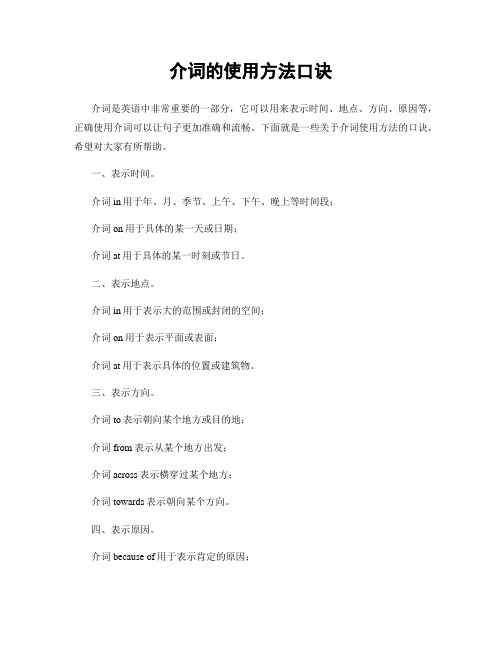
介词的使用方法口诀介词是英语中非常重要的一部分,它可以用来表示时间、地点、方向、原因等,正确使用介词可以让句子更加准确和流畅。
下面就是一些关于介词使用方法的口诀,希望对大家有所帮助。
一、表示时间。
介词in用于年、月、季节、上午、下午、晚上等时间段;介词on用于具体的某一天或日期;介词at用于具体的某一时刻或节日。
二、表示地点。
介词in用于表示大的范围或封闭的空间;介词on用于表示平面或表面;介词at用于表示具体的位置或建筑物。
三、表示方向。
介词to表示朝向某个地方或目的地;介词from表示从某个地方出发;介词across表示横穿过某个地方;介词towards表示朝向某个方向。
四、表示原因。
介词because of用于表示肯定的原因;介词due to用于表示中性的原因;介词owing to用于表示正式的原因;介词thanks to用于表示积极的原因。
五、其他常用介词。
介词by表示通过某种方式或工具;介词with表示伴随或使用某物;介词for表示为了某种目的或代表某人。
六、特殊用法。
介词in、on、at在特定搭配中有特殊用法,需要根据具体情况进行记忆和理解。
七、总结。
介词的使用方法口诀并非一成不变,需要根据具体语境进行灵活运用。
通过大量的阅读和实践,逐渐掌握介词的用法是非常重要的。
以上就是介词的使用方法口诀,希望对大家有所帮助。
在学习英语的过程中,多多积累、多多练习,相信大家一定能够掌握好介词的使用方法,写出更加地道和流畅的英语句子。
- 1、下载文档前请自行甄别文档内容的完整性,平台不提供额外的编辑、内容补充、找答案等附加服务。
- 2、"仅部分预览"的文档,不可在线预览部分如存在完整性等问题,可反馈申请退款(可完整预览的文档不适用该条件!)。
- 3、如文档侵犯您的权益,请联系客服反馈,我们会尽快为您处理(人工客服工作时间:9:00-18:30)。
介词用法知多少介词是英语中最活跃的词类之一。
同一个汉语词汇在英语中可译成不同的英语介词。
例如汉语中的“用”可译成:(1)用英语(in English);(2)用小刀(with a knife);(3)用手工(by hand);(4)用墨水(in ink)等。
所以,千万不要以为记住介词的一两种意思就掌握了这个介词的用法,其实介词的用法非常广泛,搭配能力很强,越是常用的介词,其含义越多。
下面就简单介绍几组近义介词的用法及其搭配方法。
一. in, to, on和off在方位名词前的区别1. in表示A地在B地范围之内。
如:Taiwan is in the southeast of China.2. to表示A地在B地范围之外,即二者之间有距离间隔。
如:Japan lies to the east of China.3. on表示A地与B地接壤、毗邻。
如:North Korea is on the east of China.4. off表示“离……一些距离或离……不远的海上”。
如:They arrived at a house off the main road.New Zealand lies off the eastern coast of Australia.二. at, in, on, by和through在表示时间上的区别1. at指时间表示:(1)时间的一点、时刻等。
如:They came home at sunrise (at noon, at midnight, at ten o’clock, at daybreak, at dawn).(2)较短暂的一段时间。
可指某个节日或被认为是一年中标志大事的日子。
如:He went home at Christmas (at New Year, at the Spring Festival, at night).2. in指时间表示:(1)在某个较长的时间(如世纪、朝代、年、月、季节以及泛指的上午、下午或傍晚等)。
如:in 2004, in March, in spring, in the morning, in the evening, etc(2)在一段时间之后。
一般情况下,用于将来时,谓语动词为瞬间动词,意为“在……以后”。
如:He will arrive in two hours.谓语动词为延续性动词时,in意为“在……以内”。
如:These products will be produced in a month.注意:after用于将来时间也指一段时间之后,但其后的时间是“一点”,而不是“一段”。
如:He will arrive after two o’clock.3. on指时间表示:(1)具体的时日和一个特定的时间,如某日、某节日、星期几等。
如:On Christmas Day(On May 4th), there will be a celebration.(2)在某个特定的早晨、下午或晚上。
如:He arrived at 10 o’clock on the night of the 5th.(3)准时,按时。
如:If the train should be on time, I should reach home before dark.4. by指时间表示:(1)不迟于,在(某时)前。
如:He will come by six o’clock.Jack had made some friends by the time you came.(2)在……间,在……的时候。
如:He worked by day and slept by night.5. through指时间意为“从……开始到结束”,此时与throughout相同。
如:We work hard all through the year.三. near, by, beside, at表示“在……附近”时的区别1. near表示相对的近,实际距离可能还很远。
如:Suzhou is near Shanghai.2. by和beside都表示靠近,实际距离不可能很远,但beside比by更具体地表示出“在……旁边”的意思。
如:He was sitting beside her.3. at也有“在旁边”的意思,但多表示有目的的行为所处的位置,而by和beside仅表示位置关系。
如:The students are sitting at the desks listening to the teacher.Several students are sitting by / beside the window talking about a film.四. at, in和on表示地点时的区别1. at表示地点:(1)用于指较小的地方。
如:I shall wait for you at the station.(2)用于门牌号码前。
如:He lives at 115 Zhongshan Road.2. in表示地点:(1)用于指较大的地方。
如:He lives in Shanghai.(2)虽然是很小的地方,如果说话人住在那里,也可用in。
商店、学校、机关等,若看作一个地点(point)用at,若看作一个场所(place)用in。
如:I met him at the post-office.I’m now working in the post-office.3. on表示地点,一般指与面或线接触,意为“在……上;在……旁”。
如:The picture was hanging on the wall.New York is on the Hudson River.五. besides, except, except for, but表示“除……外”之间的区别1. besides表示“除了……以外,还有……”,具有附加性质。
如:Besides Mr Wang, we also went to see the film.(王先生也去了)注意:besides用于否定句中时,与except, but同义,可互换。
如:We have no other books besides / except these.2. except表示“……除外”,具有排它性质。
如:We all went to see the film except Mr Wang.(王先生没去)3. except for表示“除了……”,即表示除去整体中的一部分。
如:The composition is very good except for a few spelling mistakes.4. but意为“除了”,与except同义,except强调被排除的部分,but则强调整句的内容,常修饰否定意义的代词。
如:Nobody knew it but me.时间介词in,on与at的用法介词in,on与at都可用于表示时间的名词前,但用法各不相同,其区别在于:一、用in的场合(1)表示“在某年/月/季节”这个含义时,须用介词in。
例如:She came to this city in 1980.他于1980年来到这个城市。
It often rains here in summer.夏天这里常常下雨。
(2)表示“从现在起一段时间以后”时,须用介词in。
例如:They will go to see you in a week.他们将在一周后去看望你。
I will be back in a month.我将在一个月后回来。
(3)表示“在某世纪”时,须用介词in.例如:This machine was invented in the eighteenth century.这台机器是在18世纪发明的.Great changes took place in the twentieth century.20世纪发生了巨大变化.(4)表示“在某年代或特定世纪某年代”时,须用介词in。
例如:This incident happened in the 1970''''s.该事件发生在20世纪70年代。
The Anti-Japanese War broke out in the 1930''''s.抗日战争爆发于20世纪30年代。
除此之外,morning / evening / afternoon 三个词也常跟介词in连用。
例如:Don't watch TV too much in the evening.晚上看电视不要太多。
They sometimes play games in the afternoon.他们有时在下午做游戏。
二、用on的场合(1)表示“在具体的某一天”或“(在具体的某一天的)早上、中午、晚上”等,须用介词on。
例如:Jack was born on May 10th,1982.杰克生于1982年5月10日。
They left on a rainy morning.他们是在一个雨天的早上离开的。
He went back to America on a summer afternoon.他于一个夏天的下午返回了美国。
(2)表示“在星期几”或“在星期几的早上、中午、晚上”等,须用介词on。
例如:We don't go to school on Saturday and Sunday.我们星期六和星期天不上学。
What time do you get up on weekdays?你在平日什么时候起床?I heard this story on Saturday morning.我是在星期六的早晨听到这个故事的。
(3)表示“在某一节日”时,须用介词on。
例如:We usually eat mooncakes on Mid-autumn Festival.我们通常在中秋节吃月饼。
Mr Hu received a card on Teachers' Day.胡老师在教师节那天收到了一张卡片。
注意:当morning,evening,afternoon被of短语修饰,习惯上用in,而不用on.例如:in the early morning of September 10th 在9月10的清晨;in the late afternoon of September 12th 在9月12日的傍晚。
三、用at的场合(1)表示“某一具体时刻(即几点几分时)”,须用介词at。
例如:He gets up at six o'clock every day .他每天六点起床。
